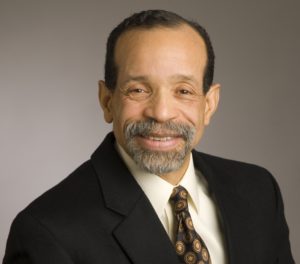 Dr. Kim Williams, is the immediate past president of the American College of Cardiology (ACC) and was the first African American ACC President. He is a nuclear cardiologist with a special interest in cardiovascular radiology and heart disease in kidney and cancer patients.
Dr. Kim Williams, is the immediate past president of the American College of Cardiology (ACC) and was the first African American ACC President. He is a nuclear cardiologist with a special interest in cardiovascular radiology and heart disease in kidney and cancer patients.
Dr. Williams, started eating a vegan diet in March of 2003. A heart patient with very high-risk findings in inspired him to try a plant-based diet. The patient initially had a heart condition that was a severe, three-vessel disease pattern of reversible ischemia. She came back to him several months later after she’d been following Dr. Dean Ornish’s Program for Reversing Heart Disease. This includes a plant-based diet, exercise, and meditation. She told him her chest pain had resolved in about six weeks on the program. Her heart scan had also become essentially normal.
Dr. Kim Williams with home ties as he was at the Wayne State University School of Medicine in Detroit, where he was a tenured professor of medicine radiology and chief of cardiology.
Great Media Talking Points
Why heart disease is the leading cause of death in the United States
The foods in your diet that can cause heart disease
How to change your diet to reduce your risk of heart disease
The medical evidence supporting the reversal of heart disease by changing your diet
Heart disease has killed more people in the United States than any other disease
The Plant-Based Nutrition Support Group(PBNSG) is excited to welcome Dr. Kim Williams (M.D., MACC, FAHA, MASNC, FESC), on Wednesday, March 29th at 6:30pm, Seaholm High School. He is the Chief, Division of Cardiology, at Rush Medical College in Chicago. Dr. Williams is the immediate past president of the American College of Cardiology (ACC) where he was the first African American ACC President. He is also a former tennis professional and follows a plant-based diet.
For most of his adult life, Williams followed what popular medical advice calls a healthy diet: no red meat, no fried foods, skinless chicken breasts, fish, fruit, vegetables, and grains. It’s the same diet that most doctors around the country tell their patients to follow right now.
He was surprised in 2003 when his LDL cholesterol (the bad kind) tested very high at 170. He did some research, looked at the published science, and changed that very day to a meat-free diet. Even after a simple web search, he realized that his skinless chicken breast had more cholesterol (84 mg/100g) than pork does (62 mg/100g). Within six weeks of going meat-free, his LDL cholesterol went down to 90 (below 100 is ideal).
Before his own switch to a plant-based diet, Williams had seen even more dramatic results in one of his own patients who made a similar change. Williams is crystal clear, in interviews and with his patients, and he doesn’t mince words when he talks about diet and heart health. He says that to prevent heart disease, “the most important things are plant-based nutrition, exercise, and weight loss. Most people will succumb to heart disease, diabetes, or hypertension on the standard American diet, which is why heart disease is the biggest killer in America. The best primary prevention strategy is improved lifestyle.”
When he speaks to patients, he tells them frankly that their health is in their own hands. “If someone already has heart disease or plaque, I will always recommend dietary change and exercise. Heart disease has killed more people in the United States than any other disease since the Spanish Flu epidemic of 1918-1920.
Wednesday, March 29, 2017
6:30 PM – 8:30 PM
Tickets available online $20 www.pbnsg.org
Seaholm High School
2436 West Lincoln, Birmingham, MI 48009
Questions contact (248) 919-8726 or connect@pbnsg.org
To learn more and purchase tickets at Plant-Based Nutrition Support Group
Plant Based Nutrition Support Group | www.pbnsg.org| 248-919-8726
PBNSG is a 501(c)(3) nonprofit organization dedicated to evidence-based education and advocacy of plant-based whole food nutrition and an active lifestyle, to help prevent or reverse chronic disease and achieve optimal health. Seek advice from your health care professional before making any changes to your current lifestyle.











